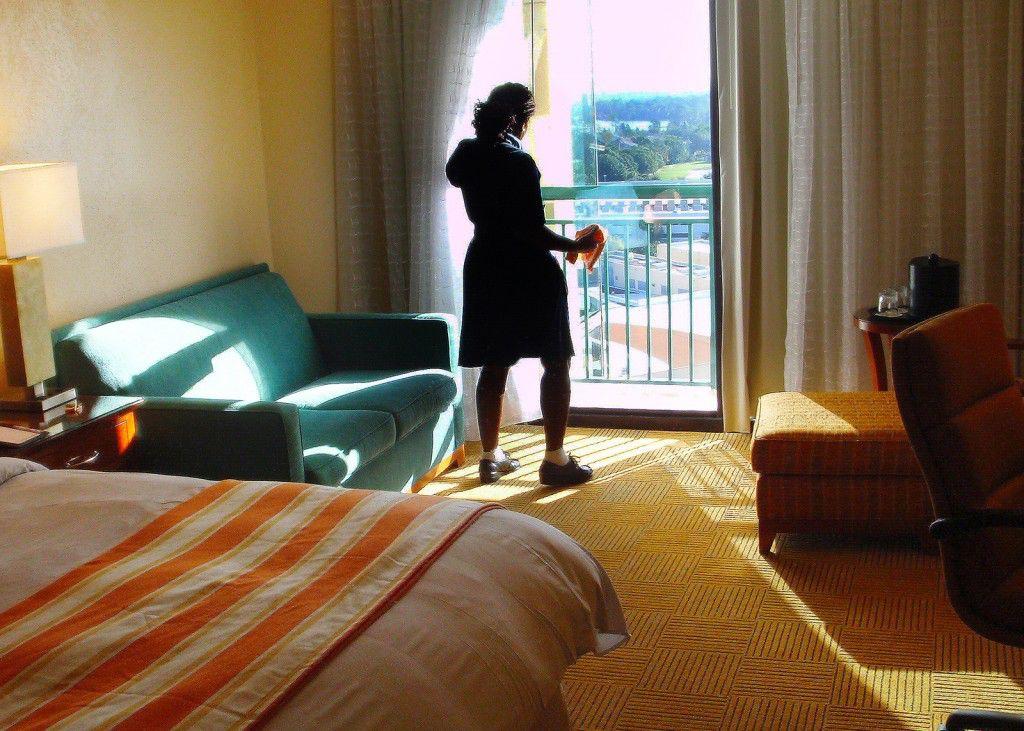After a hotel visit, you may not remember to tip the person who made your bed, cleaned your bathroom and pretended not to notice when you stole the mini shampoo bottles off the maid’s cart. But a new initiative in the hotel industry might not let you forget.
The Marriott Hotel chain has partnered with former First Lady of California, Maria Shriver, to launch a campaign to encourage hotel guests to tip their maids. Cutely titled, “The Envelope Please,” the campaign calls for envelopes to be placed in the rooms of 750 to 1,000 Marriott hotels in the United States and Canada with the message: “Our caring room attendants enjoyed making your stay warm and comfortable. Please feel free to leave a gratuity to express your appreciation for their efforts.” In short, leave the housekeeper a tip.
“The Envelope Please was born from having conversations with women I’ve met who have taken care of my room during hotel stays,” Shriver said in the Monday press release. “They told me that room attendants, who are often the primary breadwinner for their families, are often forgotten when it comes to tipping, unlike other front-of-house employees, since most travelers don’t see them face-to-face. I hope this gratitude initiative will make these women feel seen and validated.”
The recommended tip is $1 to $5 per night depending on the rate of the room, according to Marriott International CEO and President Arne Sorenson. Considering about 30 percent of hotel guests neglect to tip their maid, according to a study from Cornell University’s School of Hotel Administration, encouraging guests to show a little appreciation for these people seems like a considerate corporate move.
“Room attendants are the largest employee group within Marriott International and the heart of the house,” Sorenson said in the corporation’s press release. “We are proud to offer opportunities for job growth, strong training programs and competitive wages and benefit packages.”
But wait a second. If Marriott cares so much about their workers getting increased appreciation in the form of money, couldn’t the corporation just pay them more? The average hotel housekeeper makes a paltry, yearly salary of about $19,780, according to the U.S. Department of Labor, a number that skates along the U.S. Department of Health and Human Services definition of the poverty line for a family of three. Is it the responsibility of the hotel guests to fill in those financial blanks?
Asking hotel guests to tip their housekeepers does not exactly seem like an opportunity for job growth or any of the other Marriott advantages Sorenson mentioned. Sure, they can ask customers to leave a gratuity, but how much they leave is entirely subjective. If a housekeeper is expected to make a living off of a salary and tips, it is not entirely fair for people to get paid different amounts for doing the same work based on factors they can’t control.
And aren’t customers already paying for their room to be cleaned each day? A night in a basic guest room at the Boston Marriott Long Wharf costs about $269, according to their website. Obviously, that rate covers far more than sleeping in one of their beds and using their showers. The charges most likely arise from the amenities and the overall hotel experience the hotel provides. Surely, the cost of housekeeping is included, since coming back to a freshly-made bed with mints on the pillows is part of that hotel experience that guests expect. If people are already paying for the housekeeping services that come with their hotel visits, is it fair for the Marriott to ask them to pay an additional gratuity?
Despite these problems, this initiative is an admirable public relations move on the Marriott’s part. Championing their most unappreciated employees gives the impression that they are more than a cold, money-hungry corporation, and they have the right to want to heighten their reputation. But announcing this initiative doesn’t mean they’re going to enforce it.
Leaving a tip envelope in every room is a very passive way for the Marriott to encourage monetary appreciation for their housekeeping staff, and it probably required little effort on their part. Plus, when the time comes for a guest to slip a tip into that gratuity envelope and they neglect to do so, who is going to do anything about it? It is doubtful Marriott officials will punish those who do not tip their housekeepers.
Say what you want about the ethics of the Marriott’s initiative, but the fundamental problem is that it probably won’t even be an effective way to ensure maids receive the salaries they deserve.

















































































































